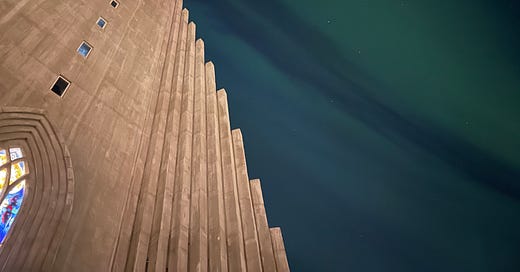This is an excerpt from my latest essay, published yesterday: “Religion Contra Dogma.” You can head straight to my site for the full essay. Or, check out the excerpt and this week’s Springboard below.
If I am religious about anything, that thing is uncertainty. I believe that all accessible "truth" is either conditional or unverifiable. What we consider true is conditioned on our senses and our tools of measurement; it's filtered through our consciousness. And any of the answers we have for questions like "What happens after death?" are unverifiable.
I don't believe that we can know anything with complete certainty. That means that whatever we deem to be true requires some degree of faith. Every truth is, in part, a belief.
I'm not religious, but I am faithful. I believe in certain unverifiable truths for which I have conditional evidence. Here are some of the beliefs that constitute my personal faith:
I believe that life is a gift, despite the fact that I will die.
I believe that all humans are autonomous moral agents with an equal capacity for reason.
I believe that all humans are inherently good, regardless of our deeds.
I believe that human life is valuable and ought to be preserved, protected, and propagated.
I believe that I'm obligated to pursue and uphold what I deem to be true, good, and just.
The difference between my faith and religion is that my beliefs are mutable — fluid — and a religion's fixed. Every statement above is conditioned by the phrase "I believe." Tomorrow, or on my deathbed, I may believe something different. Within my personal faith, I allow my beliefs to change with new knowledge and new experiences. I do not think that what I believe is immutable, unconditional, objective, or absolute. I do not think that other people should adopt my beliefs. I have these beliefs because they are what I have decided is most true to me, and in the pursuit of truth, I will continue to revise them.
Most religions don't permit skepticism. Religions squash uncertainty with unconditional beliefs. Dogma is unwavering and prescriptive. Skepticism is open and provocative.
Here, we'll explore where and why dogma exists, then discuss how to remain skeptical without losing faith.
The Business of Religion
I'm not religious, but that doesn't mean I'm against religion. And I'm not against faith — quite the opposite. I believe faith is a necessary part of living a fulfilling life. So, let's set these terms straight with a couple definitions.
Religion: A stagnant, shared, unconditional belief system founded on an unquestioning faith in unverifiable truths
Personal Faith: A mutable, individual, conditional belief system grounded in skepticism and uncertainty
The problem is not religion or faith but dogma. Dogma is dishonest and inhibits truth-seeking; it slowly atrophies your cognition and drains your capacity for inquiry. If you take your beliefs to be objective truths, you stop questioning what you know and prevent yourself from learning. You've already found the truth — the whole truth and nothing but the truth (so help me, God)!
It's important to note that dogma is not exclusive to organized religions, like Christianity. Dogma characterizes a religious attitude, which you'll find just as often in voting booths as confession chambers. (You'll find dogma in lecture halls, soccer stadiums, and coffee shops too.) It divides people by their political parties in the same way it motivated the Crusades. Dogma is a stubborn certainty that turns contradiction and disagreement into blasphemy and heresy.
All truths require faith. Anytime we deny that, we fall to dogma.
Springboard:
What is one tenet of your personal faith?
Thank you to for feedback that helped me revise and re-structure this essay.






I believe that life is a gift, despite the fact that I will die.
Here's another way to say this: Life is the whole cake, and longevity is the icing. No matter when or how I die, my life cannot be taken from me — because I have lived. I exist, which means I have received the gift of life in full. I am due nothing.
So glad I finally sat down to read this on a slow Sunday. I've been saving your essay knowing I wanted to read it deeply in a peaceful state.
You prompted me to reflect on a feeling that keeps returning. I sometimes miss religion, but I'm skeptical to practice one because I want to make sure I'm not doing so as a means to drown my existential dread with dogma. And I realize it's not religion that I miss, but faith.
I've mistakingly labeled my faith as weak because I've been comparing in to my past religion. "I'm not reading the Bible nor reciting The Lord's Prayer every night so how could I be faithful?" But as you said, faith is fluid. That's beautiful and liberating. Faith gives me the unlimited spiritual space to explore, inquire, and seek out truth for as long as I shall live.